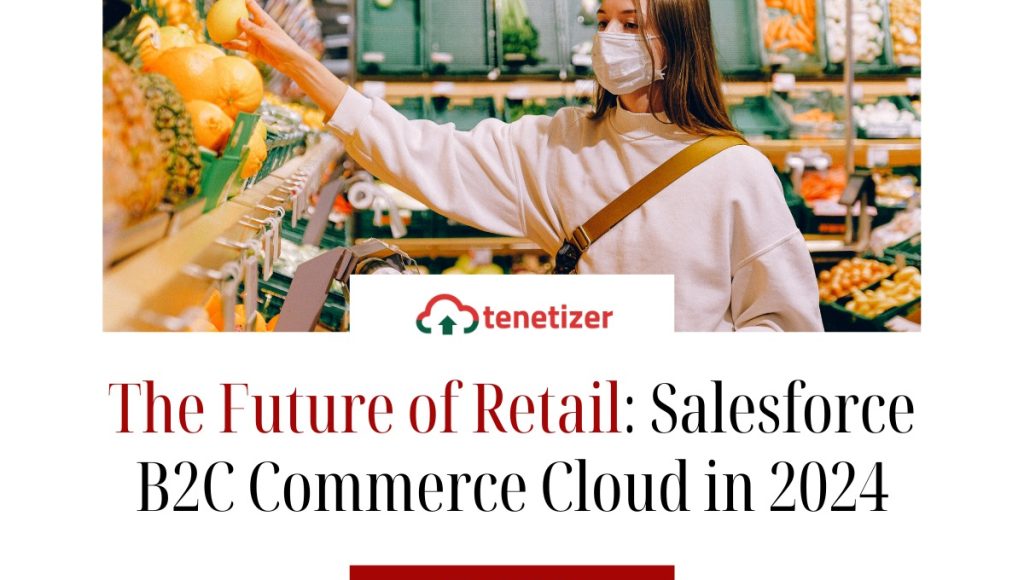The Future of Retail: Salesforce B2C Commerce Cloud in 2024
The retail industry is undergoing a digital transformation, with online platforms becoming the new frontier for businesses across all sectors. According to the Global Retail Ecommerce Forecast, by 2024, it’s projected that 21.2% of total retail sales will occur online. For businesses not yet present in the online landscape, there’s a risk of losing relevance to the evolving consumer base.
Is there a secret to creating an exceptional online shopping experience? Perhaps there is, and it goes by the name of Salesforce B2C Commerce Cloud. Whether you’re a seasoned retail expert or a newcomer to the e-commerce world, this dynamic platform serves as the key to choosing the right CRM. It not only drives sales but also fosters customer engagement and cultivates brand loyalty in ways previously unexplored.
Let’s delve into the innovative features, tools, and capabilities that make Salesforce B2C Commerce Cloud a game-changer. From streamlining website design and crafting personalized customer journeys to robust inventory management and the potency of marketing automation, this platform empowers businesses to not only meet but exceed customer expectations while enhancing financial outcomes.
Pre-Implementation Preparation: Building a Solid Foundation
Before diving into Salesforce B2C Commerce Cloud implementation, meticulous pre-planning is essential. This phase involves several critical steps to ensure a successful deployment:
1. Target Audience Identification:
Define your ideal customers, understanding their preferences and behaviors.
2. Clearly Define Business Goals:
Establish specific objectives, whether it’s boosting sales, enhancing customer experience, or expanding online presence.
3. Evaluate Existing Infrastructure:
Assess current hardware and software components, ensuring they meet specifications for seamless integration.
4. Budget Evaluation and Scalability Considerations:
Anticipate future growth, evaluate scalability requirements, and allocate a budget accordingly.
5. Team Readiness:
Define roles and responsibilities, ensuring clarity among team members.
6. Training and Skill Development:
Assess team skills and provide training if necessary to bridge any gaps.
7. Establishing a Project Timeline:
Set a realistic timeline outlining phases and milestones for smooth project progression.
Choosing the Right Salesforce Commerce Cloud Edition
Selecting the appropriate edition of Salesforce Commerce Cloud is a pivotal decision in the implementation process. Consider the following factors:
1. Budget Considerations:
Evaluate costs associated with each edition, including licensing fees and ongoing expenses.
2. Customization and Integration Capabilities:
Assess the degree of customization and integration each edition allows, ensuring alignment with business needs.
3. Making the Right Choice for Your Business:
Synthesize gathered information to select the edition that best serves business goals and growth strategy.

Salesforce B2C Commerce Cloud Implementation Strategy
The success of the implementation depends on a well-thought-out strategy. Key considerations include:
1. Define Clear Objectives and KPIs:
Establish specific, measurable, and achievable goals aligned with business needs.
2. Select the Right Implementation Approach:
Choose between Waterfall and Agile methodologies based on project nature and requirements.
3. Develop a Well-Structured Implementation Plan:
Divide implementation into logical phases, ensuring better organization and control.
4. Record and Analyze Milestones:
Define significant milestones, identify potential risks, and develop a comprehensive risk assessment and mitigation plan.
5. Integration with Existing Systems:
Identify integration points and ensure seamless communication between Salesforce Commerce Cloud and existing software.
Customization and Configuration: Enhancing the User Experience
Customizing and configuring Salesforce B2C Commerce is crucial for creating a unique online shopping experience. Consider the following:
1. Mobile Optimization:
Optimize the site for mobile devices to ensure a consistent user experience.
2. Pricing and Product Configurations:
Configure pricing strategies, discounts, and promotions to drive sales and customer loyalty.
3. SEO Optimization:
Implement strategies for optimizing the site for search engines to improve rankings and discoverability.
4. Testing and Quality Assurance:
Conduct functional, performance, and security testing to ensure a high-quality implementation.
5. Training and User Adoption:
Provide training for administrators and end-users to ensure effective use of the platform.
How Salesforce B2C Commerce Cloud Stimulates Business Growth
Salesforce B2C Commerce Cloud offers numerous advantages for businesses looking to thrive in the digital age:
1. Smart AI-powered Data Analysis:
Gain comprehensive insights into customer needs and behaviors through AI-driven analysis.
2. Improved Shopping Experience:
Implement strategies like product suggestions, foresight-based sorting, and innovative search recommendations for a seamless shopping experience.
3. Boosted Marketing Efficiency:
Leverage advanced tools for streamlined marketing and uncomplicated merchandising, aligning seamlessly with promotional endeavors.
4. Enhanced Customization:
Utilize the “Page Designer” functionality for creating visually appealing and user-friendly interfaces.
5. Device Compatibility:
Ensure excellent mobile compatibility for a consistent user experience across devices.
6. Better Customer Support:
Enhance customer visibility and support decision-making through real-time data and insights.
7. Increased Data Security:
Prioritize data security with robust measures, complying with industry standards like GDPR and PCI DSS.
Go-Live and Post-Implementation:
Launching your Salesforce B2C Commerce site is just the beginning. Implement tools and practices for monitoring site performance, addressing issues promptly, and establishing post-implementation support and maintenance procedures.
Measuring ROI and KPIs:
Measure the success of your implementation by identifying key performance indicators and measuring return on investment.
The Right Team for Implementation:
Choose a reliable implementation partner like Tenetizer Technologies, offering solutions, integrations, and AI-driven insights to drive revenue growth and enhance online customer experiences.
Conclusion
Salesforce B2C Commerce Cloud is a powerful tool for thriving in the digital age. With a clear strategy, dedication, and ongoing commitment to customer satisfaction, your e-commerce venture can exceed expectations and achieve lasting success. Embrace the possibilities, provide exceptional online shopping experiences, and unlock limitless opportunities for your e-commerce triumph. For more details contact us through form below

